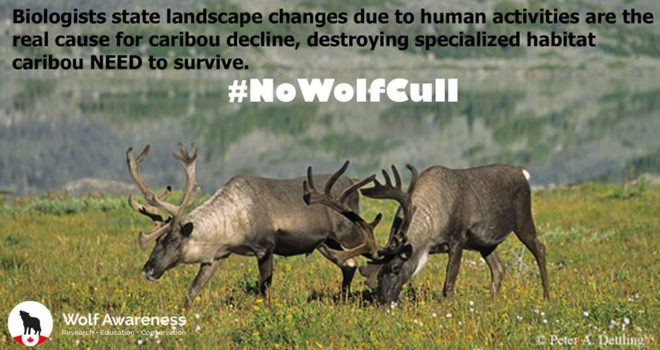FOR IMMEDIATE RELEASE
EDMONTON (July 19, 2016)— A diverse group of organizations across the country is calling on Canadians to urge the Alberta government to abandon a draft plan for the recovery of woodland caribou in North and Central Alberta. Part of the plan includes a fencing experiment that would enclose caribou within 100 square kilometers, and then slaughter many other species found on both sides of the fence.
Natural predators such as wolves, as well as deer, elk and moose, would be destroyed. Over decades, most of the areas in question have been converted from wilderness into industrial landscapes.
Independent scientists, conservation groups and animal welfare organizations are united in demanding a different future and to encourage public participation on the draft before the August 5th deadline. They include: Animal Alliance of Canada; Born Free Foundation; Cochrane Research Institute; Earthroots; Humane Society International/Canada ; Raincoast Conservation Foundation; Wolf Awareness, and many other experts.
 Through Canada’s Species At Risk Act, the Government of Alberta is compelled to contrive a strategy to recover threatened subpopulations of mountain caribou and implement it by 2017. The province released its draft plan for caribou recovery in North and Central Alberta on June 8, 2016. Contained within this proposal are the Government of Alberta’s Draft Little Smoky and A La Peche Caribou Range Plans (June 2, 2016).
Through Canada’s Species At Risk Act, the Government of Alberta is compelled to contrive a strategy to recover threatened subpopulations of mountain caribou and implement it by 2017. The province released its draft plan for caribou recovery in North and Central Alberta on June 8, 2016. Contained within this proposal are the Government of Alberta’s Draft Little Smoky and A La Peche Caribou Range Plans (June 2, 2016).
According to the 2012 federal Recovery Strategy for Caribou, 95 percent of critical caribou habitat in the Little Smoky range is already disturbed by people and their activities. Most of these disturbances are caused by industrial development and infrastructure, including forestry and the energy sector, which would continue to operate.
The groups agree with Dr. Gilbert Proulx, an independent wildlife specialist objecting the proposed plan, who believes that the first and major issue that needs to be addressed is habitat conservation and connectivity.
Dr. Proulx stated: “Killing wolves and fencing caribou in predator-free areas are not solutions that will resolve the main factor impacting on caribou persistence. However, these approaches are significantly impacting biodiversity and the welfare of wildlife communities. Claims of the efficacy of previous wolf culls in the name of caribou recovery have been determined to be unfounded in the past, and trials have been ineffective.”
“The recovery plan proposes a bloodbath so that industry can continue at all costs,” said Liz White, Director Animal Alliance of Canada. “Outside of these caribou farms, industry will continue to fragment what little is left of caribou habitat into land that supports the very animals targeted for killing.”
“This is not caribou recovery, this is simply ‘dirty oil’ and the world needs to know about it,” said Sadie Parr, executive director of Wolf Awareness. “Although we fully endorse protecting caribou and habitat, widespread killing programs and fenced enclosures are not conservation tools. They are merely tools to preserve tiny island-like farms of caribou on a carved up and impoverished landscape.” Furthermore, she questioned, “If caribou are indeed the priority, why is industrial activity planned to continue within essential caribou habitat?”
Raincoast Conservation Foundation senior scientist Dr. Paul Paquet is a world-renowned large carnivore expert and co-author with Dr. Proulx and others of a recent scientific article titled “Maintaining ethical standards during conservation crises,” published in the journal Canadian Wildlife Biology and Management (2015) . Dr. Paquet also questions the ecological validity of range plans for Little Smokey and A La Peche herds.
“These management experiments will destroy entire ecosystems, and many of the animals within, in an attempt to recover several threatened subpopulations of a woodland caribou. I can’t imagine that this was ever the intent of the Species at Risk Act,” said Paquet.
Hannah Barron, director of Wildlife Conservation Campaigns at Earthroots and also a director of Wolf Awareness, emphasized the lack of scientific rigour behind predator killing components of the proposal. “More than 1000 wolves have been killed under the guise of protecting the Little Smoky Caribou herd over the past 11 years with no significant increase in caribou numbers. Wolves have been strangled, gunned down from helicopters and poisoned using carcasses laced with strychnine. Snares set for wolves also strangled 676 other animals, including two caribou.”
“Each and every Canadian should hold our governments accountable for conservation and animal welfare,” concluded Gabriel Wildgen, campaign manager for HSI/Canada. “Hundreds of interconnected species are facing extinction in our country. Forging ahead with business as usual while scapegoating predators is embarrassing and shameful.”
-30-
Groups working together to increase awareness about the proposed plan:
- Animal Alliance
- Animal Alliance Voters Party of Canada
- Association of Fur Bearing Animals
- Bear With Us
- Born Free Foundation
- Coyote Watch Canada
- Cochrane Research Institute
- Earthroots
- Humane Society International/Canada
- Raincoast Conservation Foundation
- Valhalla Wilderness Society
- Wolf Awareness
Media contacts:
- Animal Alliance: Liz White – ph: 416-809-4371 email: liz@animalalliance.ca
- Born Free Foundation: Barry Kent MacKay – ph:(905) 472-9731, email: mimus@sympatico.ca
- Earthroots: Hannah Barron – ph:(647) 567- 8337, email: hannah@earthroots.org
- HSI/Canada: Christopher Paré – ph: 438-402-0643, o: 514-395-2914 x 206, email: cpare@hsi.org
- Raincoast Conservation Foundation: Dr Paul Paquet ph: 306-376-2015, email: ppaquet@baudoux.net, or Chris Genovali ph: 250-888-3579, email: chris@raincoast.org
- Wolf Awareness: Sadie Parr – ph: 250-272-4695, email: wolfawareness@gmail.com
- Independent Scientist: Dr Gilbert Proulx (Available only after July 24th)-ph: 780-953-6932, email: gproulx@alphawildlife.ca
